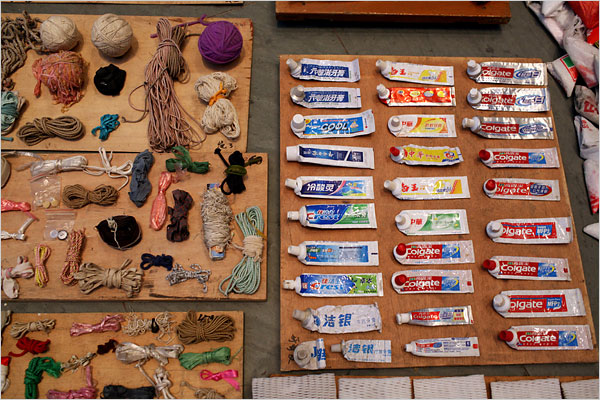Song Dong is an avantgarde installation artist from China. Conceptual interests are at the centre of his practice, which embraces photography, installation and video. Emerging from a strong Beijing-based avantgarde performance art community, Song Dong´s practice explores notions of perception, transience and the ephemeral nature of existence.
There is the skeleton of a wooden house, and around it lies a collection of utensils of all kinds, the residue of 50 years of a person’s life and indeed of 50 years of material culture in China. Put in rows on small ceilings or placed casually on the ground, on cheap bedside cabinets, on a simple wooden bed, on a kitchen fridge whose surface has flaked away and on chests whose drawers are missing, they are Mrs Song’s dearest possessions. For 50 years she has hoarded and added to them.
Here in a neat row are four televisions - one big and three small - red, pale yellow and grey. There are neckties, some of them still in transparent plastic envelopes; there are ten 10-litre oil flasks, handbags with or without ornament for festive or daily use; there is black synthetic leather; there are heaps of bottles and portable army-flasks, briefcases and suitcases. There are also the relics of childhood: a skipping rope, cuddly animals and a now legless doll. In one corner there are baskets made of plastic, raffia and metal and there are sieves. There are also bundles tied up with string, bundles of socks and sets of belts. On the installation’s rim there are wooden chairs in front of a fence of wooden boards from sets of shelves.
The installation is being shown for the first time in the West. The concept and multi-media artist Song Dong has sat among crates and bric-a-brac in the foyer of the House of World Cultures and spread the hoard out with his mother’s care. He grew up in the house next to this wooden frame in the heart of Beijing. The shabby borough was cleared away in time for the Olympics, but the government neglected to replace the old houses, so there is now an empty area.
Here in a neat row are four televisions - one big and three small - red, pale yellow and grey. There are neckties, some of them still in transparent plastic envelopes; there are ten 10-litre oil flasks, handbags with or without ornament for festive or daily use; there is black synthetic leather; there are heaps of bottles and portable army-flasks, briefcases and suitcases. There are also the relics of childhood: a skipping rope, cuddly animals and a now legless doll. In one corner there are baskets made of plastic, raffia and metal and there are sieves. There are also bundles tied up with string, bundles of socks and sets of belts. On the installation’s rim there are wooden chairs in front of a fence of wooden boards from sets of shelves.
The installation is being shown for the first time in the West. The concept and multi-media artist Song Dong has sat among crates and bric-a-brac in the foyer of the House of World Cultures and spread the hoard out with his mother’s care. He grew up in the house next to this wooden frame in the heart of Beijing. The shabby borough was cleared away in time for the Olympics, but the government neglected to replace the old houses, so there is now an empty area.
(...)This pace leaves the older generation breathless. Grown up in poverty and having to make the most of few resources, it was used to recycling, re-allocating and saving utensils for future use. The socialist motto was: ‘Waste not’. The generation gap is wide.
Looked at from a personal angle, the installation documents the history of the artist’s family. Song Dong recalls: “Every resource should be used fully, and nothing should be wasted. This code served as the basis for my mother’s daily household operations. In my childhood memories, she always led a thrifty life, trying not to waste anything for the good of our family.”
Looked at from a personal angle, the installation documents the history of the artist’s family. Song Dong recalls: “Every resource should be used fully, and nothing should be wasted. This code served as the basis for my mother’s daily household operations. In my childhood memories, she always led a thrifty life, trying not to waste anything for the good of our family.”
Song Dong objects to his contemporaries’ consumerism and prefers spiritual and artistic satisfaction. Indeed the installation ‘Waste Not’ deftly achieves several aims with a single stroke. Besides offering visitors a picture of Beijing life, it has relieved his mother of the dead weight of half a century and has done so without making her feel that her hoarding was futile. In fact her collection is now touring the world and bringing her son international acclaim.
Song Dong shows his family story, but I'd argue whit the subject of his work. Installation contains plenty of rubbish such as plastic bottles or empty tooth paste tubes. This is basically piece of garbage, which is not worth to keep. To see in gallery as well...






No comments:
Post a Comment